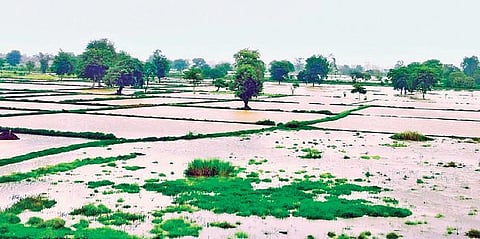

This has been a year of extremes, with COVID-19 striking a blow right in the beginning and adversely impacting lives and livelihoods of people, and the economy at large. While governments and the people alike were battling the pandemic, extreme weather events such as heat waves, fires, floods and landslides have battered nations and regions around the world. India had its share of extreme weather events, and Karnataka is no exception.
Karnataka experienced floods this year - the fourth consecutive year since 2018. In the past decade, Karnataka has also experienced drought conditions. In between these two bookends, projections of temperature and rainfall for Karnataka indicate a warming of 0.5 degree Celsius to 2 degree Celsius, an increase in rainfall by about 5 per cent to 25 per cent, and a further increase in the frequency and magnitude of heavy rainfall events of >50 mm/day, even by the 2030s, compared to the past 30 years.
While increasing climate-related disasters are because of global climate change, the risks, impacts and losses are amplified at the local level because of the inadequacy of current policies, programmes and infrastructure. Mindless development, particularly in eco-sensitive regions and urban planning that ignores nature, have exacerbated the risks of climate change.
A 'Green Index' developed in March 2020 as a composite measure of the environmental performance of government programmes in Karnataka clearly demonstrates that development and climate action could be achieved synergistically. This index composed of parameters spanning energy efficiency and renewable energy; water conservation and recycling; waste treatment and recycling; air pollution control; biodiversity conservation; carbon dioxide emission reduction or sequestration, and adaptation to climate as also those that can deliver climate mitigation and adaptation benefits, while protecting the environment.
While reversing climate change is not possible, Karnataka, which is increasingly experiencing both floods and droughts, and other forms of disasters such as hailstorms, heat waves and thunderstorms, should add a climate lens to planning, formulating, screening and implementing all its programmes, schemes and projects. A shift in thinking that climate action is an additional burden that derails development would emerge if a state government policy that mandates integration of climate information into existing as well as future programmes and projects is formulated.
The Chief Minister announced in September 2021 that Karnataka will have a ‘green budget’. This requires adoption of an index such as the 'Green Index' and expanding its scope to ensure departments provide a roadmap for green transition. This index could become a metric against which funding to various government departments is determined.
While mitigation is global, adaptation is local. Till date, much of the planning and implementation of projects is based on historical data.
However, extreme weather events are becoming the new normal. This requires mapping of climate hazard, exposure and vulnerability at district or lower scales, and improved early warning and social protection mechanisms.
Such targeted actions aimed at building resilience of systems and communities, climate-proofing assets and investments, conserving the environment, transitioning to low-carbon pathways will make Karnataka a climate resilient state, while contributing to national goals and targets such as the Nationally Determined Contribution and Net Zero targets, and ultimately, Sustainable Development Goals.
(The writer is Sector Head - Climate, Environment, and Sustainability Centre for Study of Science, Technology and Policy (CSTEP), a research-based think tank)